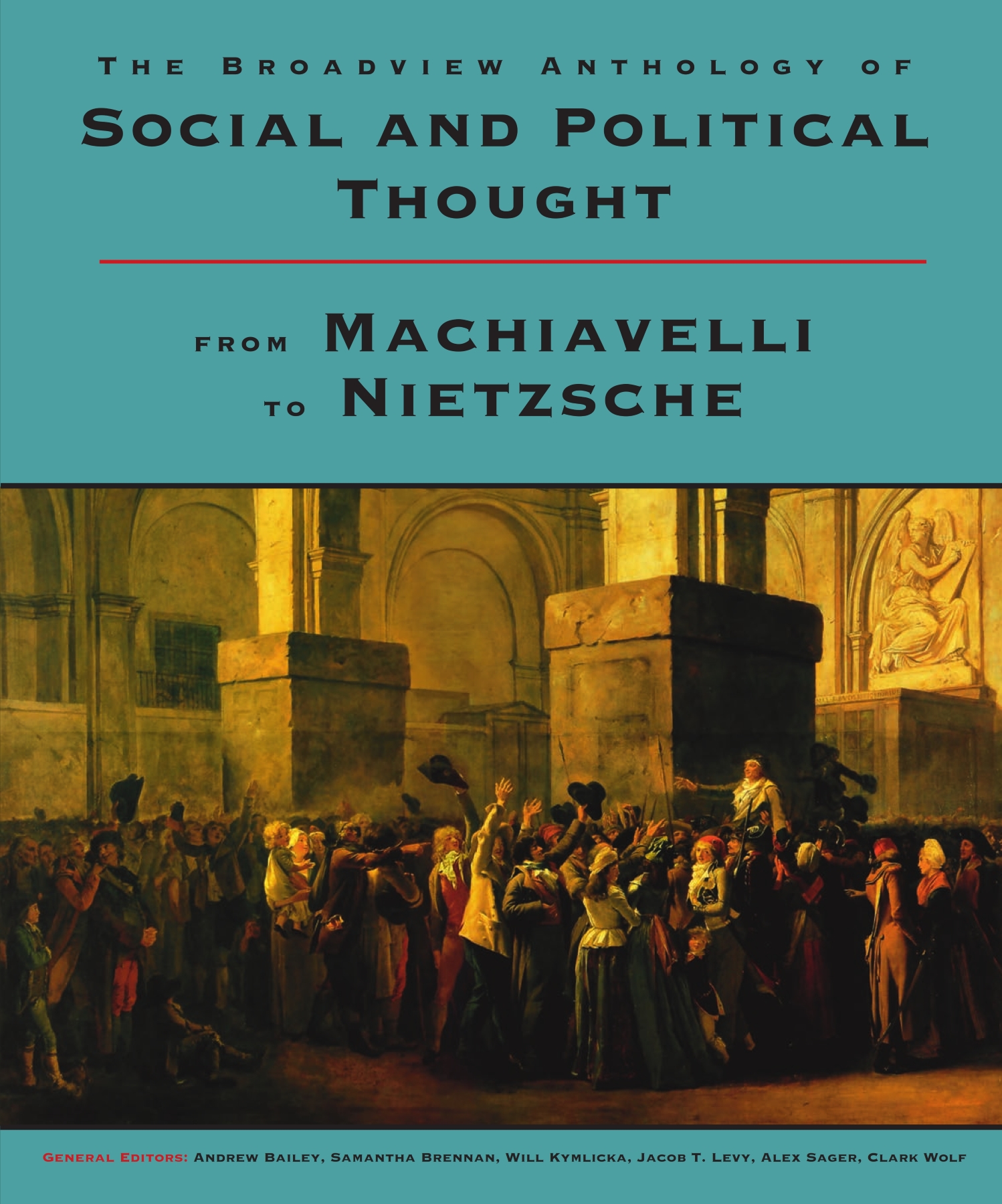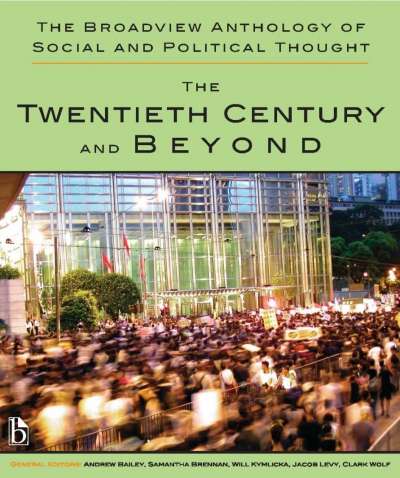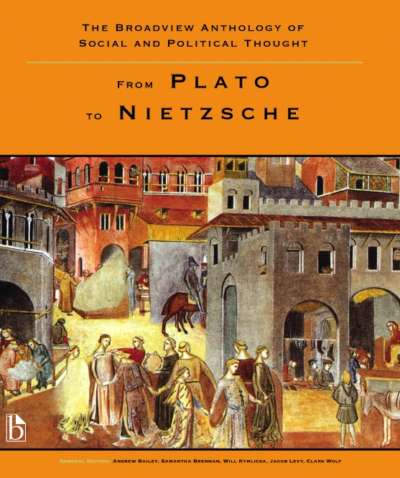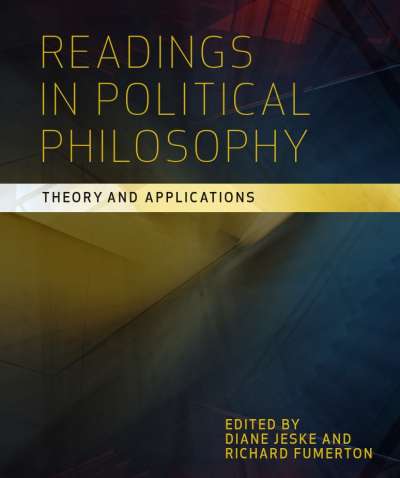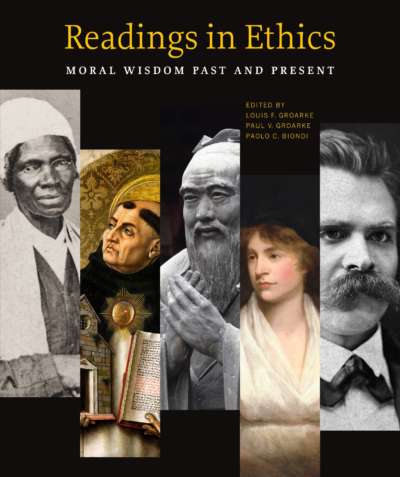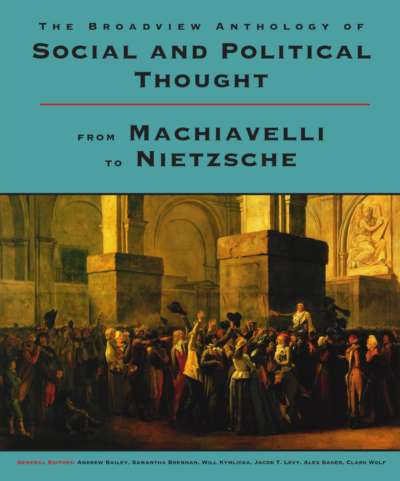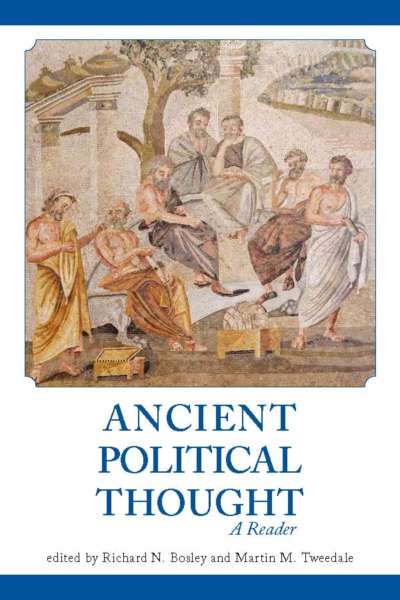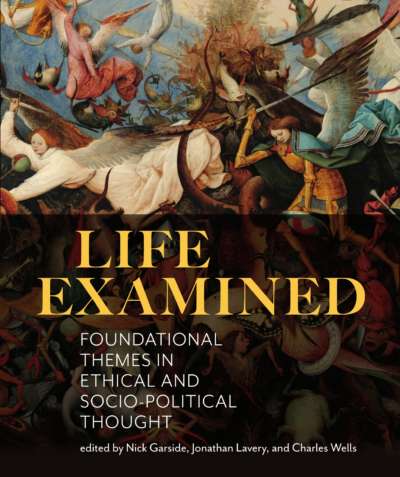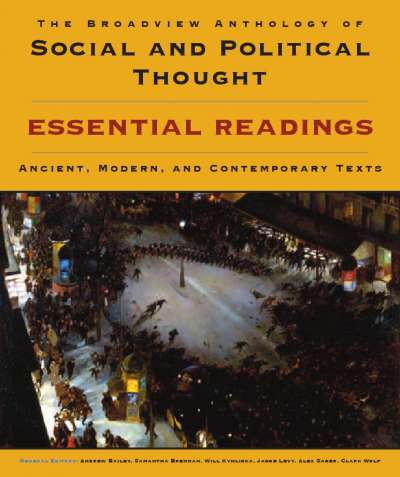This modified ebook version of The Broadview Anthology of Social and Political Thought: From Machiavelli to Nietzsche includes 90% of the material available in the print version. See the “Contents” tab for the ebook’s table of contents, or click here to see a list comparing the print book’s contents to the ebook.
This volume contains many of the most important texts in western political and social thought from the sixteenth to the end of the nineteenth century. A number of key works, including Machiavelli’s The Prince, Locke’s Second Treatise, and Rousseau’s The Social Contract, are included in their entirety. Alongside these central readings are a diverse range of texts from authors such as Mary Wollstonecraft, Sojourner Truth, and Henry David Thoreau. The editors have made every effort to include translations that are both readable and reliable. Each selection has been painstakingly annotated, and each figure is given a substantial introduction highlighting his or her major contributions within the tradition. The result is a ground-breaking anthology with unparalleled pedagogical benefits.
Praise for The Broadview Anthology of Social and Political Thought
“This is a wonderful collection, with great introductory essays. … We should all be grateful to the editors for selecting and contextualizing so rich a body of materials.” — Kwame Anthony Appiah, New York University
“The selections are broader than in other works I have seen. … The annotation is, as advertised, fuller than is usual in such works, and consistently helpful. … All in all, this is an impressive work—by far the best political anthology I have seen.” —George Klosko, Henry L. and Grace Doherty Professor, University of Virginia
“Quite simply, this is a fantastic anthology. It includes not just the standard readings from the western canon but also important ones left out of most anthologies, including several by women. The anthology includes concise, accurate, and extremely helpful introductions, which include, uniquely, a discussion of ‘common misperceptions’ of each work. These introductions are perfectly pitched for an undergraduate audience.” —Darren Walhof, Grand Valley State University
Preface
Acknowledgments
NICCOLÒ MACHIAVELLI
- The Prince (written 1513, published 1532)
- Dedication
- Chapter 1: How many kinds of principalities there are, and by what means they are acquired
- Chapter 2: Concerning hereditary principalities
- Chapter 3: Concerning mixed principalities
- Chapter 4: Why the kingdom of Darius, conquered by Alexander, did not rebel against the successors of Alexander at his death
- Chapter 5: Concerning the way to govern cities or principalities which lived under their own laws before they were annexed
- Chapter 6: Concerning new principalities which are acquired through one’s own arms and ability
- Chapter 7: Concerning new principalities which are acquired either through the arms of others or by good fortune
- Chapter 8: Concerning those who have obtained a principality through wickedness
- Chapter 9: Concerning a civil principality
- Chapter 10: Concerning the way in which the strength of all principalities ought to be measured
- Chapter 11: Concerning ecclesiastical principalities
- Chapter 12: Of the different types of troops and mercenaries
- Chapter 13: Concerning auxiliary, mixed, and citizen soldiers
- Chapter 14: That which concerns a prince on the subject of the art of war
- Chapter 15: Concerning things for which men, and especially princes, are praised or blamed
- Chapter 16: Concerning generosity and miserliness
- Chapter 17: Concerning cruelty and mercy, and whether it is better to be loved than feared
- Chapter 18: Concerning the way in which princes should keep their word
- Chapter 19: That one should avoid being despised and hated
- Chapter 20: Are fortresses, and many other things to which princes often resort, advantageous or hurtful?
- Chapter 21: How a prince should act in order to gain esteem
- Chapter 22: Concerning princes’ advisors
- Chapter 23: How to avoid flatterers
- Chapter 24: Why the princes of Italy have lost their states
- Chapter 25: Of fortune’s power in human affairs, and how to deal with her
- Chapter 26: An exhortation to liberate Italy from the barbarians
JOHN CALVIN
- from On Civil Government (1534)
THOMAS HOBBES
- from Leviathan (1651)
- The Introduction
- Part 1: Of Man
- Chapter 10: Of Power, Worth, Dignity, Honor, and Worthiness
- Chapter 11: Of the Difference of Manners
- Chapter 13: Of the Natural Condition of Mankind as Concerning Their Felicity and Misery
- Chapter 14: Of the First and Second Natural Laws, and of Contracts
- Chapter 15: Of Other Laws of Nature
- Chapter 16: Of Persons, Authors, and Things Personated
- Part 2: Of Commonwealth
- Chapter 17: Of the Causes, Generation, and Definition of a Commonwealth
- Chapter 18: Of the Rights of Sovereigns by Institution
- Chapter 19: Of the Several Kinds of Commonwealth by Institution and of Succession to the Sovereign Power
- Chapter 20: Of Dominion Paternal and Despotical
- Chapter 21: Of the Liberty of Subjects
- Chapter 26: Of Civil Laws
- Chapter 29: Of Those Things that Weaken or Tend to the Dissolution of a Commonwealth
- Chapter 30: Of the Office of the Sovereign Representative
JOHN LOCKE
- The Second Treatise of Civil Government (1690)
- Preface
- Chapter 1: Of Political Power
- Chapter 2: Of the State of Nature
- Chapter 3: Of the State of War
- Chapter 4: Of Slavery
- Chapter 5: Of Property
- Chapter 6: Of Paternal Power
- Chapter 7: Of Political or Civil Society
- Chapter 8: Of the Beginning of Political Societies
- Chapter 9: Of the Ends of Political Society and Government
- Chapter 10: Of the Forms of a Commonwealth
- Chapter 11: Of the Extent of the Legislative Power
- Chapter 12: Of the Legislative, Executive, and Federative Power of the Commonwealth
- Chapter 13: Of the Subordination of the Powers of the Commonwealth
- Chapter 14: Of Prerogative
- Chapter 15: Of Paternal, Political, and Despotical Power, considered together
- Chapter 16: Of Conquest
- Chapter 17: Of Usurpation
- Chapter 18: Of Tyranny
- Chapter 19: Of the Dissolution of Government
- from A Letter Concerning Toleration (1689)
MARY ASTELL
- Some Reflections upon Marriage (1700)
DAVID HUME
- A Treatise of Human Nature (1739–40)
- Part 2: Of Justice and Injustice
- An Enquiry Concerning the Principles of Morals (1751)
- Appendix 3: Some Farther Considerations with Regard to Justice
- Of the Original Contract (1748)
JEAN-JACQUES ROUSSEAU
- Discourse on the Origin and Foundations of Inequality among Men (1755)
- Preface
- Discourse on the Origin and the Foundations of Inequality among Men
- Appendix 1: Note 9 [On Good and Evil in Human Life]
- Appendix 2: Note 10 [On Human Variety]
- Appendix 3: Note 12 [On the Views of John Locke]
- Appendix 4: Note 16 [On Humans Living in an Intermediate Stage]
- On the Social Contract or the Principles of Political Right (1762)
- Foreword
- Book 1
- Book 2
- Book 3
- Book 4
ADAM SMITH
- The Wealth of Nations (1776)
- from Book 1. Of the Causes of Improvement in the Productive Powers of Labor; and of the Order According to Which Its Produce Is Naturally Distributed among the Different Ranks of the People
- Chapter 1: Of the Division of Labor
- Chapter 2: Of the Principle Which Gives Occasion to the Division of Labor
- Chapter 3: That the Division of Labor Is Limited by the Extent of the Market
- Chapter 10, Part 2: Inequalities by the Policy of Europe
- from Book 4
- Chapter 2: Of Restraints upon the Importation from Foreign Countries of Such Goods as Can Be Produced at Home
- Chapter 9: Of the Agricultural Systems
IMMANUEL KANT
- Groundwork for the Metaphysics of Morals (1785)
- from Preface
- First Section: Transition from the Common Rational Moral Cognition to the Philosophical Moral Cognition
- from Second Section: Transition from Popular Moral Philosophy to the Metaphysics of Morals
- On Perpetual Peace: A Philosophical Sketch (1795)
- Perpetual Peace
- Section One: Containing the Preliminary Articles for a Perpetual Peace among States
- Second Section: Which Contains the Definitive Articles for a Perpetual Peace among States
- First Supplement: Concerning the Guarantee of Perpetual Peace
- Second Supplement: A Secret Article for Perpetual Peace
- Appendix I: Concerning the Disagreement Between Morality and Politics in Connection with Perpetual Peace
- Appendix II: On the Unanimity Between Politics and Morality According to the Transcendental Idea of Public Right
THOMAS JEFFERSON
- The Declaration of Independence [as amended and adopted in Congress], July 4, 1776
ALEXANDER HAMILTON and JAMES MADISON
- The Federalist No. 9
- The Federalist No. 10
- The Federalist No. 51
- The Federalist No. 78
MARY WOLLSTONECRAFT
- A Vindication of the Rights of Woman: With Strictures on Political and Moral Subjects (1792)
- Advertisement
- Introduction
- from Part 1
- from Chapter 1: The Rights and Involved Duties of Mankind Considered
- from Chapter 2: The Prevailing Opinion of a Sexual Character Discussed
- from Chapter 3: The Same Subject Continued
- from Chapter 4: Observations on the State of Degradation to Which Woman Is Reduced by Various Causes
- from Chapter 5: Animadversions on Some of the Writers Who Have Rendered Women Objects of Pity, Bordering on Contempt
- from Chapter 6: The Effect Which an Early Association of Ideas Has Upon the Character
- from Chapter 9: Of the Pernicious Effects Which Arise from the Unnatural Distinctions Established in Society
- from Chapter 12: On National Education
- from Chapter 13: Some Instances of the Folly Which the Ignorance of Women Generates; with Concluding Reflections on the Moral Improvement that a Revolution in Female Manners Might Naturally Be Expected to Produce
EDMUND BURKE
- from Reflections on the Revolution in France (1790)
- from On “Geographical Morality”
JEREMY BENTHAM
- An Introduction to the Principles of Morals and Legislation (1780,
published 1789)
- Chapter 1: Of the Principle of Utility
- Chapter 4: Value of a Lot of Pleasure or Pain, How to Be Measured
- Chapter 13: Cases Unmeet for Punishment
- Offences against One’s Self: Paederasty, Part 1 (1785)
- Panopticon; or the Inspection-House (1787)
- Letter 1: Idea of the Inspection House
- Letter 2: Plan for a Penitentiary Inspection-House
- Letter 5: Essential Points of the Plan
- Letter 6: Advantages of the Plan
JOHN STUART MILL
-
- On Liberty (1859)
- from Chapter 1: Introductory
- from Chapter 2: Of the Liberty of Thought and Discussion
- from Chapter 3: On Individuality, as One of the Elements of Well-Being
- from Chapter 4: Of the Limits of the Authority of Society over the Individual
- from Chapter 5: Applications
Considerations on Representative Government (1861)
-
-
- from Chapter 10: Of the Mode of Voting
- Chapter 16: Of Nationality, as Connected with Representative Government
Utilitarianism (1863)
-
-
- from Chapter 2: What Utilitarianism Is
- from Chapter 3: Of the Ultimate Sanction of the Principle of Utility
- from Chapter 5: On the Connection between Justice and Utility
from The Subjection of Women (1869)
HARRIET (HARDY) TAYLOR MILL
- The Enfranchisement of Women (1851)
SOJOURNER TRUTH
- Speech Delivered at the Akron, Ohio Convention on Women’s Rights, 1851
- As Reported by the Anti-Slavery Bugle, 21 June 1851
- As Reported by F.D. Gage for the National Anti-Slavery Standard, 2 May 1863
ALEXIS DE TOCQUEVILLE
- Democracy in America (1840)
- Book Two, Section 2
- Chapter 5: On the Use that Americans Make of Public Associations in Civil Life
- Chapter 6: Of the Relation between Associations and Newspapers
- Chapter 7: The Relationship between Civil and Political Associations
- Chapter 8: How Americans Combat Individualism with the Principle of Self-Interest Rightly Understood
HENRY DAVID THOREAU
- from Civil Disobedience (1849)
KARL MARX and FRIEDRICH ENGELS
- On Bruno Bauer’s On the Jewish Question (1843)
- On Bruno Bauer’s The Capacity for the Present-day Jews and Christians to Become Free (1843)
- Economic and Philosophical Manuscripts (1844)
- Estranged Labor
- Private Property and Communism
- from The German Ideology (1845)
- A. Ideology in General, German Ideology in Particular
- Theses On Feuerbach (1845)
- The Communist Manifesto (1848)
- Bourgeois and Proletarians
- Proletarians and Communists
- Socialist and Communist Literature
- Position of the Communists in Relation to the Various Existing Opposition Parties
- Critique of the Gotha Program (1875)
FRIEDRICH NIETZSCHE
- Beyond Good and Evil
- from Part Five: A Natural History of Morals
- from Part Nine: What Is Noble?
- On the Genealogy of Morals
- from First Essay: Good and Evil, Good and Bad
- from Second Essay: Guilt, Bad Conscience and Related Matters
Index of Authors and Titles
Andrew Bailey, University of Guelph; Samantha Brennan, University of Western Ontario; Will Kymlicka, Queen’s University; Jacob Levy, McGill University; Alex Sager, Portland State University; Clark Wolf, Iowa State University

